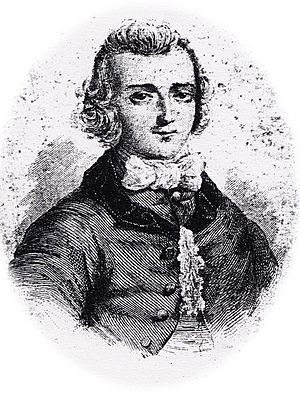Louis de Jaucourt facts for kids
Quick facts for kids
Louis de Jaucourt
|
|
|---|---|
 |
|
| Born | 16 September 1704 Paris, France
|
| Died | 3 February 1779 (aged 74) Compiègne, France
|
| Nationality | French |
| Occupation | Physician, philosophe, writer |
| Known for | Encyclopédie |
Chevalier Louis de Jaucourt (16 September 1704 – 3 February 1779) was a French scholar. He is famous for being the person who wrote the most articles for the Encyclopédie. This was a huge book project in the 1700s.
Jaucourt wrote about 18,000 articles. This covered topics like how the body works (physiology), chemistry, plants (botany), diseases (pathology), and even political history. He wrote about 25% of the entire Encyclopédie all by himself, and he did it for free! For a long time, other writers like Denis Diderot and Jean-Jacques Rousseau were more famous. But now, people recognize Jaucourt's amazing work more.
Contents
The Life of Louis de Jaucourt
Early Life and Education
Louis de Jaucourt was born in Paris, France, in 1704. He was the youngest son in a noble family. His family were Huguenots, who were French Protestants. At that time, Protestants were often viewed with suspicion in Catholic France. Because of this, Jaucourt could not fully rely on his family's wealth or status. He decided to become a scholar instead.
He studied many different subjects. He learned about religion (theology) in Geneva. He then studied natural sciences at the University of Cambridge in England. After that, he studied medicine in Leiden, a city in the Netherlands.
His Work as a Scholar
When Jaucourt returned to France, he spent 20 years writing a huge six-volume book. This book was called Lexicon medicum universale, and it was all about how the human body is built (anatomy). He tried to publish it in Amsterdam to avoid strict French rules about books. Sadly, the ship carrying his only copy of the manuscript sank. All 20 years of his hard work were lost.
Even with this setback, he continued his work. He practiced medicine and became a respected member of several important groups. He was a Fellow of the Royal Society in London. He was also a member of academies in Berlin, Stockholm, and Bordeaux.
Working on the Encyclopédie
Becoming a Key Writer
Jaucourt started working on the Encyclopédie as a volunteer. He was asked to join the project by the publisher, Michel-Antoine David, for the second volume. At first, he wrote only a few articles for each new volume. But over time, he became more and more involved.
Between 1759 and 1765, Jaucourt wrote an amazing amount. He wrote about 8 articles for the Encyclopédie every single day! In total, he wrote 17,266 articles out of 71,818. This means he wrote about 25% of the entire work. He wrote around 4,700,000 words! Because he wrote so much, he was called l'esclave de l'Encyclopédie, which means "the slave of the Encyclopedia."
Praise for His Dedication
The main editor of the Encyclopédie, Diderot, was very thankful for Jaucourt's hard work. Diderot wrote that Jaucourt was like a sailor who finally sees land after a long, dark night. He said that Jaucourt never stopped working, even when friends or powerful people tried to get him to do other things. Diderot noted that Jaucourt gave up his rest, his health, and his own interests completely for the project.
Unlike other writers, Jaucourt was already wealthy. He did not ask for any money for his full-time work on the Encyclopédie. He even paid a group of secretaries himself to help him. They would write down what he dictated.
His Writing Style
Jaucourt often summarized information from other books and long works. He would copy parts of existing sources directly into his articles. Some people thought he should have written more original ideas.
However, Jaucourt still showed his own beliefs in his articles. He did this by carefully choosing which parts to highlight. He also emphasized certain ideas and used specific words. He chose authors who helped spread the messages he believed in. For example, in his article on "Government," he copied almost word-for-word from the writings of John Locke. Locke's ideas were very strong politically. To avoid trouble with the government's censors, Jaucourt often hid the names of his sources. Sometimes, he would even say a quote came from someone else, like Tacitus, when it actually came from a modern writer.
Topics He Covered
Jaucourt mainly wrote about science, especially medicine and biology. He believed that the body worked like a machine (a "mechanist" view). This was different from another writer, Ménuret de Chambaud, who thought the body had a special life force.
Besides science, Jaucourt wrote about many other subjects. His articles on history and society showed his strong political and philosophical ideas. He wrote important articles about war, kings (monarchy), people, and Muhammad. His writing was not as openly political as other writers like Diderot and Voltaire. But it was clear he had strong beliefs.
He often criticized things by comparing the past to his own time. For example, in his article "Paris," he used historical facts to comment on modern France. This way, he could get his ideas past the censors. He also criticized Divination (trying to predict the future) and superstition. He believed these were simply mistakes in thinking.
Most importantly, Jaucourt wrote strong articles against slavery and the slave trade. He believed that buying and selling people was terrible. He argued that everyone has a basic right to freedom. He also felt that even superstitions were better than beliefs forced on people.
Louis de Jaucourt died in Compiègne at the age of 74. His dedication to the Encyclopédie helped spread many important ideas of the Enlightenment.
Images for kids
 | Jackie Robinson |
 | Jack Johnson |
 | Althea Gibson |
 | Arthur Ashe |
 | Muhammad Ali |


